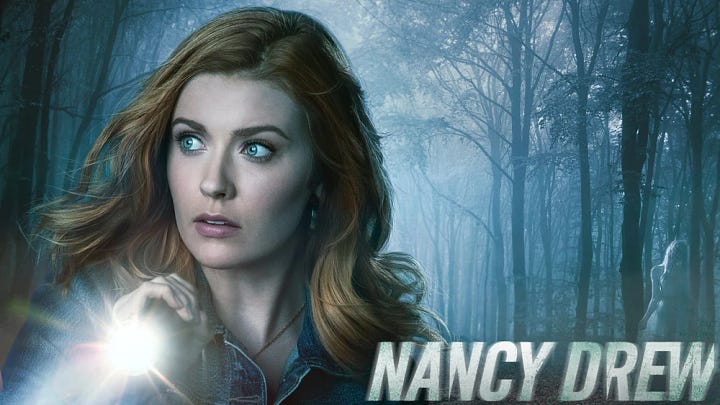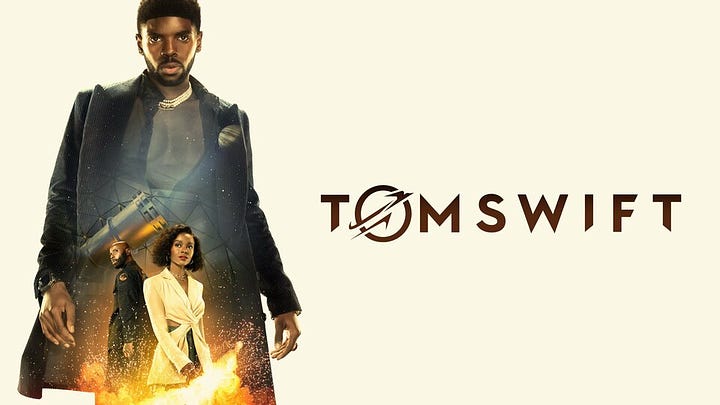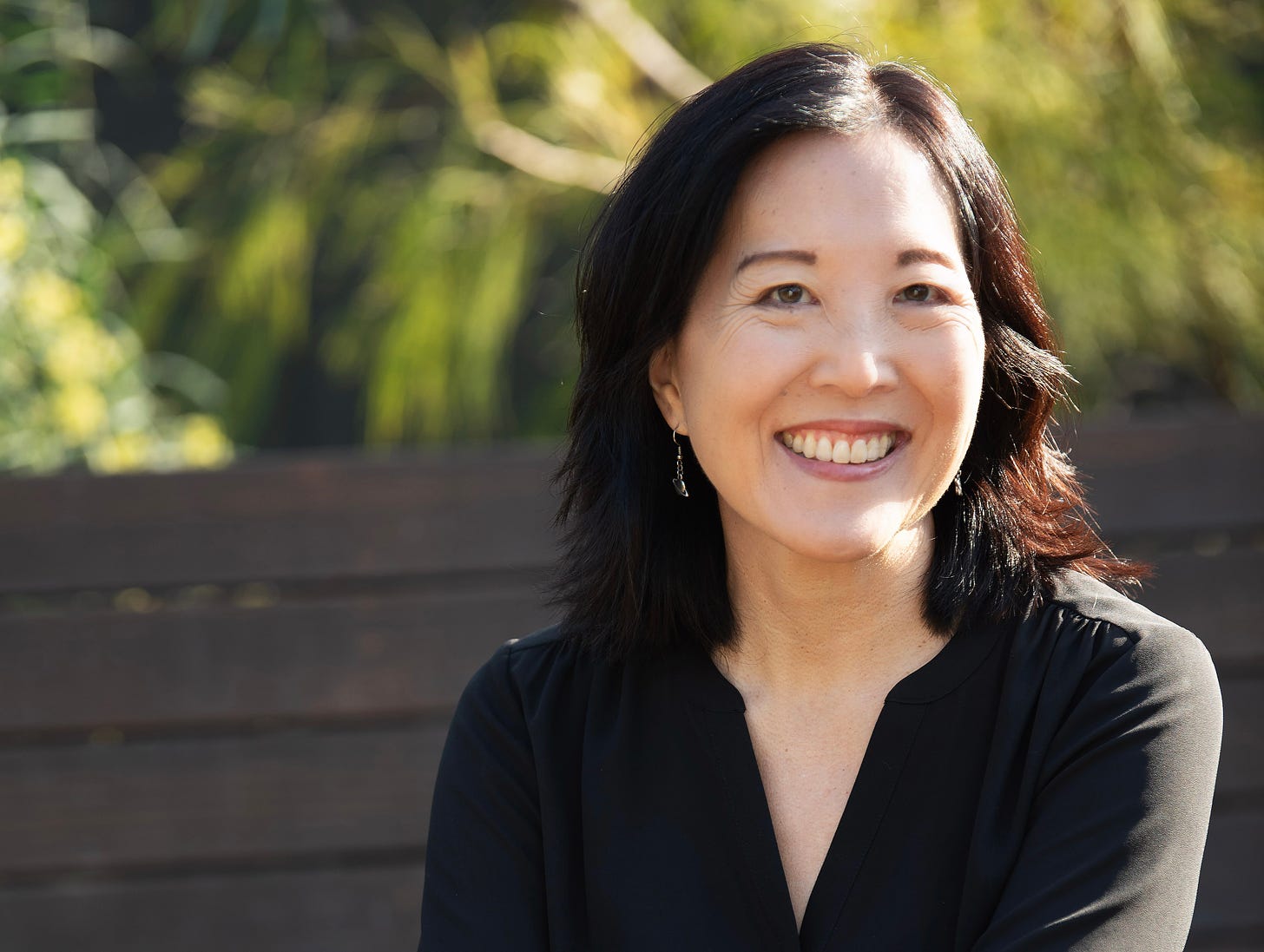Q&A: Screenwriter Melinda Hsu Knows How to Change Hollywood
The 'Nancy Drew' and 'Tom Swift' showrunner discusses craft, storytelling, and transforming the film/TV business through the practice of kindness
When I asked journalist Maureen “Mo” Ryan, the author of Burn It Down: Power, Complicity, and a Call for Change in Hollywood, for some suggestions about powerful women I should invite to be part of 5AM StoryTalk’s artist-on-artist conversation series — women who might offer new perspectives about film and television that would challenge outdated, but still pervasive ideas in our still male-dominated industry — she immediately suggested TV creator/showrunner Melinda Hsu. And having now chatted with Melinda, I can only say I’m very grateful that Mo did.
Melinda has been a professional screenwriter for a quarter-century now. She’s seen and done it all at this point, including staffing on “Lost” (for which she was nominated for both Writers Guild of America and Emmy screenwriting awards), “Medium”, “Falling Skies”, and “The Vampire Diaries” amongst others. More recently, she took over “Nancy Drew” as showrunner and co-created and showran its spin-off “Tom Swift”.
But along the way, Melinda encountered a great deal of toxic behavior and abuse in writers’ rooms (far from a unique tale of woe, sadly). This toxicity inspired her to begin compiling a list of ideas about how she would run her own rooms differently, which eventually came in handy on “Nancy Drew” and “Tom Swift” where she got to put them into action.
The central tenet of Melinda’s showrunning approach can best be described as — I shit you not — kindness. But not just choosing polite words like please and thank you, asking how people’s days are going, that sort of thing. We’re talking about the practice of it, the same way we might practice mindfulness or even our screenwriting craft. Don’t worry, we get into all this in great detail during our conversation and it will make much more sense coming from Melinda’s mouth. There’s a very good chance it might radically change not just how you think about the TV writers’ room, but also any other collaborative work environment.
For aspiring and emerging screenwriters, pay close attention to how Melinda developed her craft through a methodical analysis of episodic TV. For screenwriters — or, frankly, anyone with a pulse — study every word she utters about kindness and creating a positive workplace; I find them so obvious and yet so revolutionary in 2024.


COLE HADDON: Melinda, we were introduced by Maureen Ryan whose book Burn It Down revealed some pretty terrible things that happened to you early in your career. Unkind by every definition. By contrast, you host a podcast today where you talk about fostering both kindness and inclusion in professional environments. I wanted to start there, not with the negative, but the positive. Can you tell me about someone whose kindness changed your life as an artist?
MELINDA HSU: My first mentor in the industry was Natalie Chaidez. She was assigned to me after I got into the Warner Bros. Writers’ Workshop, and she wrote me a letter in which she told me, “I want to see you succeed.” No one had ever said that to me before, and it was tremendously meaningful to hear that from a woman of color who was already a high-powered TV writer-producer. She also had kids, which sent a strong message that it was possible to be both a loving mother and a badass TV writer. Natalie’s generous, patient mentorship and script coaching gave me an incredibly helpful boost as I was coming through the WB workshop, and her encouragement from that first letter was emotionally sustaining through some very challenging times.
CH: Mentors are unbelievably important in the arts, which I think I only realized too late. I mostly relied upon reps for encouragement, but, as you know, even though there are good ones — and I’ve had a few of those — their interests do not perfectly overlap with their clients’. How do you think Natalie’s kindness has reverberated through your career?
MH: For one thing, I actually use that phrase when I encourage others - “I want to see you succeed.” It’s a powerful thing to say, if you’re sincerely connecting with another person. Also, the notes she gave me on a “Law & Order” spec made it a good sample as I was starting out. I wrote another sample during the workshop – a spec for “The Shield” – but it built on the pro tips she’d taught me and the confidence she instilled in me. The combination of the specs and my workshop legitimacy led to many meetings and my first few jobs on staff. So, I owe her a great deal, and I often think of her when I’m mentoring a younger writer.
CH: Okay, let’s turn back the clock for a moment to find out how you became the person who was able to accept Natalie’s guidance — her kindness — and action in it into a positive outcome. Where did you grow up? More importantly, who were you as a child?
MH: I was on a panel recently where someone asked me to describe what I was like in high school, and I immediately said, “Alone.” That was pretty true of my childhood before high school, too, though I was — and still am — very close with my older brother, and I still have a few close friends from my hometown. But I also was very timid and isolated and self-conscious as a kid, because I grew up in Bangor, Maine. My parents were academics at the University of Maine. They were both immigrants from China who had fled the Communist takeover as refugees. In Maine, there were almost zero non-white people in the state when I lived there. Without exaggeration. So, I didn’t look like anyone else and my parents were strict tiger parents with strong Chinese accents, and I spent my whole childhood hiding in my bedroom reading The Lord of the Rings over and over again – because in those stories, if you were different, it was cool!
“I spent my whole childhood hiding in my bedroom reading ‘The Lord of the Rings’ over and over again – because in those stories, if you were different, it was cool!”
CH: It’s interesting, I’ve never heard anyone describe the value of diversity in Lord of the Rings, but it is indeed a world filled with racial differences and yet the narrative is entirely focused on characters falling in love with each other despite historical differences. Completely unrelated to that, my sister is Korean and I had to watch her experience exactly what you describe growing up, less the tiger Chinese parents. I understand it, at least by proximity. It sounds like you were a big fan of genre fiction, then?
MH: Yes, my first fiction writing was “Star Trek” fan fiction when I was eight. I wrote a series of stories about a super-genius telepathic telekinetic baby who got beamed up to the Enterprise accidentally and had all these adventures. I wouldn’t let myself go outside to play until I had written five more pages in my little spiral notebook with my Number 2 pencil. Then, after I finished each novella, I would type them up on our electric typewriter. None of this seemed odd to me as a kid.
CH: Did it seem odd to your parents? How did they make sense of these creative instincts?
MH: My mom kept me in a steady supply of spiral notebooks and Number 2 pencils, so I think she liked that I was doing something productive with my time. She and my dad never expected me to try to make a career out of writing because they hoped I would do something stable and sensible. As far as my creativity seeming odd to them, I don’t know what their barometer for “odd” was, really. My dad gave us math lessons every day during summer vacations in elementary school, to push us as far beyond our grade level as possible. My mom tutored us in Chinese. There was no such thing as relaxing for the sake of relaxation in our house, ever. So, I guess they were glad I wasn’t just sitting around enjoying being an eight-year-old.
CH: [Laughter] An easy childhood, then. Did your parents hold onto your childhood novellas? This fan fiction and other genre meanderings? I think I threw mine away when I first moved out of home, to save my parents the effort of storing what I saw as junk at the time, but I regret it today.
MH: My parents didn’t hang onto them, but fortunately my best friend from down the street did. She had also illustrated the first novella after I typed it up — on an electric typewriter! — so I have the whole thing as a pdf. Occasionally an executive or a friend will ask to read it, and I get a kick out of sharing this window into my childhood brain. I guess the themes were about emotional connection and belonging despite external differences, and you can see my longing for adventure in the writing and the world-building - because of course the Enterprise visited multiple planets and encountered numerous alien species while my protagonist was aboard.
CH: So, you were an incredibly lonely, but imaginative child with a great passion for genre fiction and genre writing. It seems like the natural progression would be some kind of arts school or degree. What happened next?
MH: After overachieving my way through high school, I went to college at Harvard and thought I would become some kind of professional person who my parents would be proud of, but eventually realized — especially with the help of a summer in Mexico City right after graduation, working as an English teacher, but feeling terribly isolated and homesick — that the only thing that made me happy was writing, and so I went to grad school at Columbia to get an MFA in Film. I always tell young people not to go to film school, but it was a really good experience for me, and a couple of my screenplays got optioned right when I was about to graduate, and I thought, “Oh great! I’ll move to LA and they’re going to make my movies and my parents will finally be proud of me!”
CH: Why am I suspicious that any of that ever happened?
MH: I came to LA and years went by. I worked all kinds of terrible, humbling day jobs — but to this day I am grateful that no matter what else is going on in my life, at least I’m no longer driving the golf cart to give the tours at the Warner Bros. lot, and at least I’m no longer a short-order cook in a bar — and finally my ex encouraged me to apply for the Warner Bros. Writers’ Workshop. At first, I was like, I don’t even watch TV. I work alone. But eventually, I applied — after teaching myself TV structure from watching and charting “Law & Order” repeats — and I got into the Warner Bros. Writers’ Workshop and then I started my TV career from there because, it turns out, I really like working with other people and I really like writing for TV.
CH: Wait, wait, is that true? You didn’t even watch TV? I’m trying to do the math here, and I feel like you must’ve moved to Hollywood during the twilight of network’s Golden Age. “The Sopranos” hadn’t changed things yet, so features, especially given the ascendence of independent film in the nineties, must’ve been what you were most passionate about?
MH: Yes, I loved features. Columbia was big on the indie film auteur path at the time that I went there, but I always loved blockbusters and feel-good movies. I’m not proud.
CH: I want to dig a bit deeper into how you taught yourself TV structure by watching and charting “Law & Order” episodes. I know screenwriting guides have some value, but I’m much more of a proponent of learning by interrogating others’ work, by developing the tools to identify what and how others do it and then repeating it in our own fashion. You’re one of the first artists I’ve met who did it with the same kind of mathematical precision I did it. Did that experience teach you anything about the craft that might’ve been muddied by more traditional how-to templates?
MH: I know what you mean about how-to guides – I’ve never found those useful. I’ve tried to read one or two, and it’s like they won’t go in my eyes because they’re so rule-based and totally removed from the finished product of what you watch onscreen.
CH: Precisely.
MH: My method of analyzing reruns helped me connect the dots for myself in a live and entertaining way. This was before DVRs, so I was watching these episodes play uninterrupted except by commercial breaks. I remember the first one I sat down to watch - and I had literally never watched “Law & Order” before, either. I had a yellow legal pad on my lap, and I wrote down the time stamp of everything that happened.
Zero seconds: two guys moving a couch down a flight of stairs. One’s complaining about his wife, and the other one says – Oh my God, they found a body!
Thirty seconds. Now the cops are on the scene, and they’re examining the victim. No defensive wounds on her hands; she knew her attacker; lividity proves the body’s been moved, liver temperature says time of death was before three AM; someone makes a joke about traffic. Title card.
One minute.
And so on, all the way through the episode. But as I was making notes, I was registering the clues in the mystery, and wondering why the nephew in the dry-cleaning business interrupted his aunt’s conversation with the detectives to say something totally mundane while bringing something on a hanger into the room. Turns out the nephew was the killer, so that’s why they had to give him lines in Act 1! Then, when the cops actually caught the killer and it was only thirty minutes into the episode, I thought: Well, what now? They caught the guy, and there’s half an hour left. Oh, wait a minute. They’re gonna have a trial. Law and Order. I get it. The whole thing was a revelation.
“As I was making notes, I was registering the clues in the mystery, and wondering why the nephew in the dry-cleaning business interrupted his aunt’s conversation with the detectives to say something totally mundane while bringing something on a hanger into the room.”
CH: As I said a moment ago, this kind of analysis involves a lot of mathematical precision. In some ways, it’s like swallowing the blue pill because you know what the Matrix is now and you can never go back. It also feels inevitable in some way given how you described your childhood. How did this skill manifest in the writers’ rooms as you were breaking into the business?




